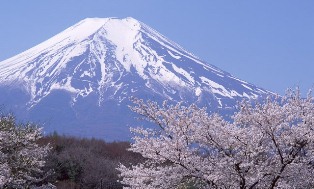| |
Living in Japan:When the West Meets the East
My name is Giannakou Eleni and I come from Athens City , Greece . I am a graduate student of the Technological Educational Institute of Mesologi, where I studied Fish Culture and Fisheries for 4 years. I applied for the MEXT scholarship, provided by the Japanese government, in June of 2002. Among the documents in the folder to be submitted at the embassy for applying was an acceptance letter which had to be written by the professor who would be my supervisor.* Therefore, prior to applying I needed the letter. I contacted several Japanese professors of my field by email, inquiring on the Master's and Doctorate programs at their universities and if I was qualified to apply. There were moments of concern because of the time between request and acceptance due to the deadline given by the embassy. I waited patiently for a reply. I had to meet the deadline given by the embassy for submission and time passed quickly and I patiently waiting for a reply.
I received a positive response from the professor and the acceptance letter 2 months after my first inquiry. I was thrilled with the fact that the opportunity offered. The acceptance letter was necessary for my application and without delay I submitted the documents folder. A plus point of my application was that all documents required were in the folder, filled correctly. I recommend advance completion to all MEXT applicants.
*This procedure has changed since 2006: the letter of acceptandce from Japan is not required for the application. After the Embassy's screenings, five or six candidates are asked to find their professor and receive the letter of acceptance.
I was accepted as a MEXT scholarship student at Mie University of Mie Prefecture in Japan . I began my studies at the university as a research student in the Fish Pathology laboratory for two semesters, starting in April 2003. I then completed a written exam and was interviewed for admission for master's program in April 2004 for four semesters. I attended master's program classes at the Graduate School of Bioresources, Division of Life Sciences section of Fisheries Science. My master's study was on fish diseases and fish pathology as well as vaccination techniques. All the lectures were in Japanese. Each semester I submited 3 reports which were written in English, one for every class I had.Studying for classes as well as performing experiments was my daily routine consuming many hours each day. I always managed to steal 3 hours every day to dedicate for myself. In those hours, I would shop or meet with friends, going out for dinner or karaoke. I found it very refreshing, keeping my focus by taking the break. |
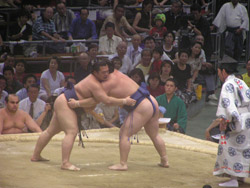 |
On arrival to the university I enrolled in a Japanese language course as my professor recommended. The language course was for 6 months, attending morning classes Monday through Friday. There were 2 different classes for Japanese, Beginning and Advanced. I was instructed to enroll in the Advanced class since I was able to comprehend Japanese already. I had chosen to learn Japanese, as a third language, before leaving Greece with a self teaching method. Every day life in Japan, communicating mostly in Japanese with my supervisor and classmates at the laboratory and classes at the university helped me improve my ability in speaking Japanese and was able to create complex sentences and have a normal conversation as well as write Japanese, so the language course was effective. The key for social integration in the Japanese society is learning to communicate in the language spoken. It is considered a plus by most Japanese people for a foreigner to speak their language or at least try. It is surprising how fast attitudes can change if the native language is used.
|
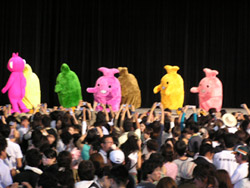
|
In the beginning I came across many difficulties in every day life. For almost 2 months I did not use public transportation nor trains and had to walk everywhere because although I could understand what I was told , I couldn't express myself in Japanese so people were reluctant to help me find my way, even though I did speak English, which to me is a foreign language too. If I had questions while lost, people suggested I ask a police officer. When I found one, the police officer could not help because he did not understand English and didn't make an effort to understand my Japanese. When I needed to go to a governmental office such as town hall or the immigration office I asked Japanese friends to come with me for assistance. I couldn't always find people to assist me in translating. Sometimes doing official paperwork was very difficult and caused much delay. One thing I thought strange was that official documents and papers which were addressed to foreign people, such as the alien registration card application and health insurance documents were all in Japanese. None of these documents had English text. At times, I brought my Japanese dictionary along, but people spoke too fast for me and couldn't use it. Sometimes I took the papers with me, filling them out before arriving, because the impression given was there was no time for explanation by the official. They asked me if I had Japanese friends who could translate the texts for me. This treatment caused discomfort because I had a very heavy program at the university and I could not schedule hours away to settle my business and certainly I could not excuse myself from the laboratory whenever I wanted. The discomfort made me more eager to learn the language so I studied very hard. |
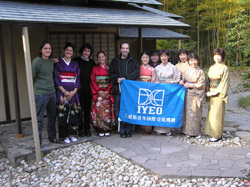 |
When the semester of language ended I could handle every day conversation at a very satisfactory level. Two years after my arrival in Japan I joined a student club. Members of the club were people who were interested in other cultures and languages and the club attracted many foreigners as well as Japanese people. Among other activities of the club, I attended several traditional festivals and did 3 trips to factories and 1 trip to a rather huge shipyard as well as hiking nearby mountains and watching fireworks festivals in the summer. We visited Nara National Park and stayed there for 3 days as well as Kyoto area for another 3 days. While in Nara we visited the oldest temple with the largest Buddha statue. In Kyoto we had the opportunity to visit the Kiyomizu-dera , a wonderful temple which was open to the public after 400 years.
|
The field trips included the original Honda factory, Toyota factory and the Sony factory. We saw how cars were made and how the latest mobile phones were assembled. We also saw a documentary on alternative forms of energy which I found very interesting. The guides of all these tours were speaking Japanese although 70% of the group were foreigners from several countries.
I was not a member of this club for long due to my heavy schedule at the laboratory. Six months after I joined I had to stop attending the meetings. While I was interacting with foreigners I got to learn more about south-east Asian countries such as Thailand , Singapore , Malaysia and Indonesia . They were very interesting and vivid people with exotic cultures. I also learned more about Indian culture as well as Bangladeshi culture which resembles India 's but is predominantly Muslim.
|
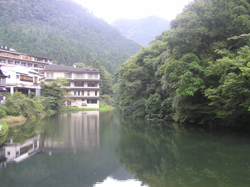 |
While I was living in Japan I was receiving a monthly stipend which was enough for me to live. I did not have to rent an apartment because I qualified to live in a women's dormitory all 3 years I studied in Japan . The dormitory was autonomous, the residents made many rules of residency which never caused problems. An important responsibility in the dorm was sorting trash. In Japan , recycling garbage is accepted all over the country. Japanese people accept this at an early age. Certainly the dorm could not be an exception to the rule, therefore we needed to sort paper, glass and plastic before disposing, and sometimes this was difficult for me! I lived in the country side and I used my bicycle for transportation so I didn't have to pay train or bus fares. I also found that vegetables and fruits of European origin in Japan were very expensive when comparing prices to Greece . An example is buying tomatoes each and not by kilo as I am used to. Spinach and lettuce taste different and cheese was a rare delicacy. What was more interesting is that one could buy half a lettuce or half a cauliflower and the sizes were much smaller.
|
I learned how to cook Japanese food and some dishes were really tasty. My favorite was miso soup, made by smashed beans which give the flavor. I liked that it can be made in many different styles just by adding the ingredients someone desires. I found this soup very enjoyable to eat. One dish that was a challenge in the beginning and then became great fun was sushi and sashimi. My favorites are salmon, tuna, smoked eel, and sardines with lots of wasabi in the sauce.
I would advise future MEXT scholarship applicants and students to do sufficient research on every day life in modern Japan and read books that give insight on the unique culture of Japanese people before deciding to go there for studies. It will be easier for them to adjust in the new society they are about to enter. I would also advise people interested in studying in Japan to be open minded and not to be afraid to live in a different society and therefore to avoid be judgmental. Life in Japan is a great experience for everyone and it can alter the perspectives of the world we possess and broaden our horizons.
←
Εμπειρίες Αποφοίτων
|
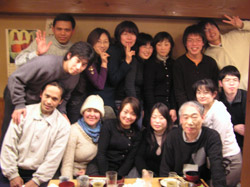
|
|
